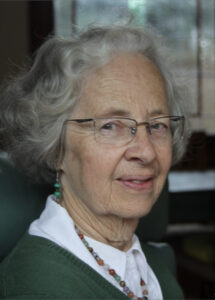
Rosalie Joyce was born in Chewton, Victoria on 6 May 1904, the daughter of Miriam and Harry Joyce. She had an older brother, Alfred, and a younger sister Mary who would become Mary Learmonth. It is through her sister, a former member of the South Rhine Church, that she came to be interred in the South Rhine cemetery. Rosalie’s father was a Congregational Minister and during her early life the family moved to parishes in Prahran, Ballarat and East Malvern. She was educated at state schools in each posting, before finally attending Korowa Anglican Girls School in Melbourne in 1918-21, finishing as head prefect and dux of the school.
After leaving school, Rosalie was awarded a teaching scholarship and in 1922 was offered a position at Spring Road State School in Malvern and later Somerville House in Brisbane. In that era there was no formal teacher training, but an assumption that someone judged to have aptitude could learn on the job. Rosalie had much more success teaching a group of senior primary students at Sommerville than dealing with a class of 78 beginning students at Malvern as a 17-year-old.
From an early age Rosalie had her sights set on missionary work and in 1926 moved back to Melbourne to attend the Melbourne Bible Institute for missionary training. In 1927 she transferred to Parkin Congregational College in Adelaide as a candidate for the London Missionary Society. She studied for a Bachelor of Arts at the University of Adelaide and a Bachelor of Divinity at Parkin College. While at University she began her involvement with the Australian Student Christian Movement, later becoming co-President.
After graduating from the University of Adelaide in 1929, Rosalie was devastated when she failed the medical examination needed to serve overseas with the London Missionary Society. But as was to be the case across her life, the disappointments of doors closing were often followed by other offers and opportunities. In 1930 she joined the Australian Student Christian Movement (SCM) as Travelling Secretary. She had much in common with her father and in January 1932 they had arranged a short holiday at Port Elliot. Tragically he was swept to his death by a freak wave and undertow at Middleton Beach on Australia Day. Rosalie was lucky to escape herself. Reverend Joyce was only 57 and at that stage minister at Port Adelaide and a highly regarded senior Congregational cleric.
In 1934 Rosalie resigned her position at SCM and travelled to India to marry Oliver McCutcheon, a Methodist missionary at Azamgarh in north-eastern India, who she had met through the SCM when they were both students. Their son John Kimball, (known as Kim) was born in 1935. Before Kim was a year old and at the time when Rosalie had taken him to the mountains to escape the oppressive summer heat of Azamgarh, Oliver contracted pneumonia. He died in 1936 before she had completed the 24-hour journey to be with him.
After returning to Australia, Rosalie McCutcheon worked in various jobs to support herself and her son. In 1941-47 she worked at Frensham School in the Southern Highlands of New South Wales as head of the Junior School. In 1949-53 she was Australian Secretary for World Students Relief (later called World University Service) in Melbourne, assisting refugees and overseas students with their education and adjustment to Australia. In 1953 she worked briefly as Secretary of the Incorporated Association of Registered Teachers of Victoria before rejoining Frensham at Gib Gate (Frensham Junior School).
In 1956 Rosalie travelled to England, working periodically for the British Council of Churches. In 1958 she returned to Australia and until 1964 worked again for the Australian Student Christian Movement as a Resident Secretary, counselling students at the Universities of Sydney and New South Wales. After a year of travel in India, Ceylon, Singapore, Thailand and Hong Kong, she joined International House at the University of Sydney as Deputy Director, where she worked until her retirement in 1972.
Across her life Rosalie wrote letters, essays and gave numerous speeches and talks as well as radio broadcasts. She published a book on living a Christian life: “Like a tree planted.” Her extensive papers, amounting to 15 boxes have been deposited in the National Library in Canberra.
The three most significant men in her life all died early: her father drowned at Middleton Beach in 1932 aged 57; her husband died of pneumonia in India in 1936, aged 32; and her son who worked as a mental health nurse in Sydney died of a heart attack in 1981 aged 45. Despite it all Rosalie considered she had been greatly blessed throughout her life. She had been given opportunities to serve, to apply her intellect, and to put her faith into practice. She had a wide circle of friends, both in Australia and across the world. She was close to her sister Mary, throughout. Her life had been rich and rewarding in ways far beyond the material.
Rosalie McCutcheon spent the last few years of her life at Resthaven at Leabrook and died on 17 February 1992. The following September her ashes were interred in the South Rhine cemetery.
Source: June Epstein. Rosalie McCutcheon: a memoir (1993)
https://nla.gov.au/nla.obj-341290517/findingaid (papers)

